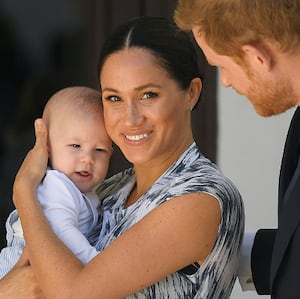This Friday, Harry and Oprah’s new multipart documentary on mental health will screen on Apple’s streaming service (to the mild irritation, one imagines, of Apple’s rivals Netflix, who are said to have given Harry and Meghan a cool $100m deal.)
The Me You Can’t See, while pitched as a documentary about mental health in general, will most likely be of widest interest to the public for the specifics of Harry’s own story, and the manner of his public rehearsal of it.
Will Harry weep? Will he blame his father for failing to protect him in the wake of his mother’s death? Will he talk in more detail about the exact nature of the therapy he has received?
While previously the prospect of such an invasive and revealing documentary would have sent the royals into a tailspin, they must be getting used to it these days and Buckingham Palace maintained its customary aura of calm Wednesday.
Official royal accounts on social media chose to focus on the news of Princess Beatrice’s pregnancy, rather than congratulate Harry and Meghan on their third wedding anniversary. In another business-as-usual semaphore, Kate Middleton turned out for the grand, post-COVID re-opening of London’s Victoria and Albert museum. Wearing a mask and a demure Alessandra Rich dress, there could hardly be a less disruptive statement of royal continuity. The theme of the V&A’s big reopening exhibition was, appropriately enough, Alice in Wonderland.
If the institution of monarchy was merely feigning complete indifference to the now all-too familiar prospect of yet another brickbat being lobbed at it courtesy of Oprah and the Sussexes, it was certainly doing a very convincing job.
The Sussex camp, meanwhile, was doing its best to up the ante. The couple chose their wedding anniversary (can it really only be three years they walked down the aisle?) to announce on their Archewell website that they are opening a new community and vaccination hub in COVID-hit India. Meanwhile, journalists were being sent out personal notes from Oprah, in which she recalled the new series had sprung from a conversation about mental health with Harry, and a trailer for the show went heavy on images of Harry, Meghan, and even Archie.
To judge from both the trailer and a promotional podcast interview by Harry last week, Harry is prepared to sacrifice his privacy for these films. That the series will include an analysis of his trauma at the death of his mother and his anger with his father for his cold parenting and the “genetic pain” handed down to him has been well telegraphed.
The prospect of Harry using his personal trauma to promote a TV show would once have sent shivers down the spine of courtiers at Buckingham Palace, but not now. The palace’s quiet confidence this week reflects the fact that Harry and Meghan’s attacks on them so far, while upsetting, embarrassing and somewhat bewildering to the individual family members concerned on a human level, are increasingly understood—to the enormous relief of palace spinners—to be ineffective and even counterproductive.
The monarchy is, generally, a beloved institution in the U.K., and Queen Elizabeth especially so. Astonishingly the first Oprah interview, which painted a hideous picture of an uncaring and racist institution, actually provoked an outpouring of support for Her Majesty.
The death of Prince Philip a few weeks later, and the quiet stoicism of the lonely queen at his stripped down, COVID-compliant funeral, only reinforced the sympathy.
The revelation in Wednesday’s Sun that one of the queen’s new puppies has died at 5 months seems unlikely to have been ordered up by even the most calculating of courtiers, but one can hardly think of a more humanizing storyline if indeed Harry does once again seek to cast the royals as lacking in basic humanity.
British approval ratings for the monarchy were essentially unaffected when Meghan and Harry launched their first attack on the royals courtesy of Oprah back in March, but the couple themselves suffered a vertiginous drop in popularity, and have continued to do so. Some 60 percent of Britons now believe the couple should either be stripped of, or voluntarily stop using, their Duke and Duchess titles, according to a YouGov poll, carried out on May 17.
Polling firm YouGov found that 36 percent of Britons said after the Oprah interview that their sympathies lay with the queen compared to just 22 percent who said theirs were with Meghan and Harry. In America, of course, it was a very different story: YouGov U.S. asked the same question of Americans and found that just 13 percent supported the queen while 29 percent supported Harry and Meghan.
Another example: YouGov U.S. polled 1,400 Americans after Oprah: 54 percent said they had a “favorable” opinion of Harry, while 48 percent had a favorable opinion of Meghan. (Interestingly, only 10 percent of Donald Trump voters like Meghan).
Such figures won’t bother the royals—they lost America long ago after all—but the extraordinary divergence of opinion by nation speaks volumes about the canny marketing decision the Sussexes have made to focus their efforts on America, where they have much higher public support and likeability ratings (although Harry would do well to avoid to many more incidents like his description last week of the First Amendment as “bonkers.” Fox News’ Sean Hannity used the clip to call Harry a “right royal pain in the ass.”)
While the exact contents of the show have yet to be revealed, the reality is that few people will be tuning in to gather pearls of wisdom about mental fitness from other participants such as Gwen Stefani.
Everybody knows it is Harry’s story that is box office here, and all the evidence available so far suggests Harry won’t hold back when it comes to laying the blame on his family for his own mental health difficulties.
The reaction of the palace? For now, at least, it’s simply a case of Keep Calm and Carry On.







